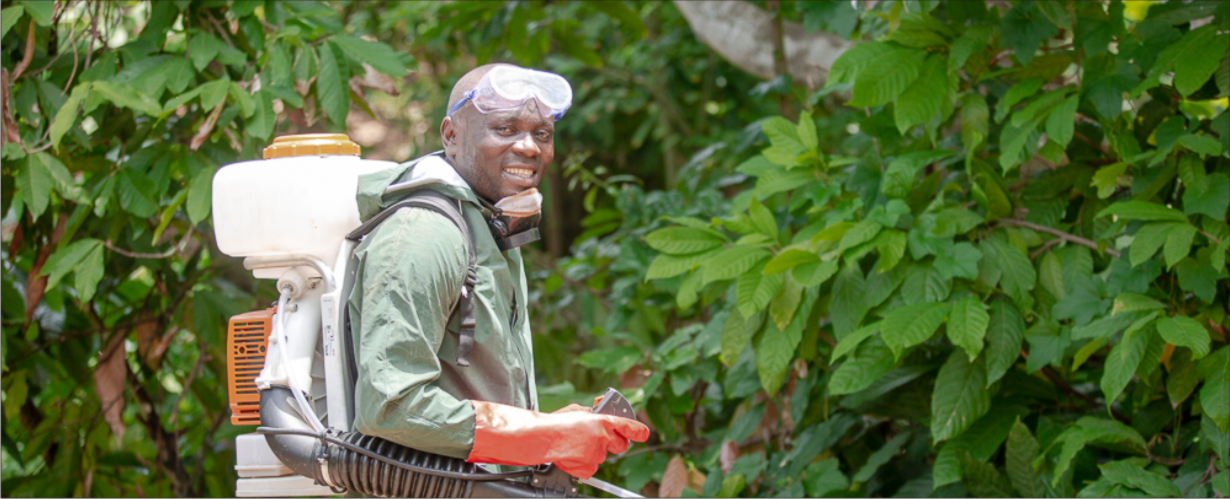REDUCING POVERTY
Surviving the COVID-19 Threat: Cocoa Sector
Our cocoa-value-chain project helps cocoa farmers and processors increase their production quality and quantity, their sales and income, and the number of new jobs in the sector. These farmers and processors accomplish this through good cocoa agricultural practices, access to extension services, improved technologies, quality seedlings, and enhanced market relationships.
Summary of Outcomes in 2020
10,988 Reached
7,036 Increased their Productivity and Sales
NGN 628.2 Million Leveraged
936 New Jobs Facilitated
PERSONALIZING COMMERCIAL EXTENSION SERVICES: "I KNOW MY FARMERS BY NAME"
“I am Anthony Akinmade, a farmer from Ondo State, and also one (1) of the agro-dealers that PIND trained through Saro Company in farming cocoa, farming in palm oil, farming in cassava. I have five (5) to seven (7) people that I have, in turn, trained on how to use the machines to prune cocoa trees, to clear, to apply chemical, and different types of chemicals to be applied, and they have joined me, and we are working together. If I get some little job at a farm, I call them so we can go together. Right now, I have maybe 5000 farmers I have trained that I know with their numbers, their names, with their villages. At least one (1) of them calls me per day. I go to one (1) farm and send my boys (co-trainers) to the other villages. We go there, we negotiate fees, and it’s been moving fine as we are getting more profits and more gain from it. PIND has added so much income for me. They (PIND and Saro Company) trained us, and we went outside there and told some people, and through us, they have gained so many things too”.
The cocoa value chain is made up of farmers, aggregators, and exporters. Agro-input suppliers and farm service providers mainly support the farmers via information, inputs, and technologies that enhance their productivity.
Cocoa farmers depend on crop protection products (herbicides, pesticides, fertilizers, fungicides) and technologies for pruning trees, spraying, and weeding. These are all supplied by input companies, farm service providers, and technology promoters. The COVID-19 restrictions hindered the movement of these inputs to the farmers, leading to an increase in logistics and transactional costs and the resultant scarcity and higher procurement costs for the inputs. The restrictions on movement led to a shortage of required labor for their production activities and for service providers, with farmers spending up to five (5) percent to eight (8) percent higher for production.
As an adaptive measure, cocoa farmers engaged more with farm service providers (FSPs)—a class of service providers who provide sector-expert technical services—for the critical services they needed. To help cocoa farmers remain profitable, the FSPs used phone calls and short messaging service (SMS) platforms to reach their farmer clients, facilitating the delivery of inputs to farmers in distant communities. This was accomplished through a partnership with retailers and input companies who provided farm services training and sold retailed inputs to cocoa farmers. The small group trainings centered around agronomic practices, post-harvest practices, and new technologies. This helped cocoa farmers remain in business while also facilitating new business opportunities and income for the FSPs and input companies.
“PIND has trained us, through Saro Company, on how we can use machines in farming in cocoa, farming in palm oil, and in cassava. We are not using manual things like cutlass and hoe again. They introduced to us this pruner, and other machines like that which are faster than the manual machines”– Anthony Akinmade, Agro-dealer, Ondo State.
Nigerian cocoa beans are poorly valued in the international market because of their poor quality, caused by poor post-harvest practices—which means less income from the sales for cocoa farmers. To create an incentive for cocoa farmers to produce quality cocoa beans, PIND launched an intervention that offers a price premium for quality beans.
The year saw the pilot intervention kick off in Ondo State via a partnership with Subjugate Nigeria Limited, a cocoa bean off-taker. About 1,000 cocoa farmers were guaranteed a one (1) to 1.5 percent premium on each kilogram kg of quality beans produced at the prevailing market price.
The program trained 40 lead farmers to become lead trainers, who taught other farmers on cocoa bean-quality-improvement practices. At a baseline average yield of 959 kg on 2.25 ha per farmer and an average market price of NGN 700 per kg of good-quality cocoa beans, this amounts to over NGN ten (10) million worth of future additional income from premium pricing.


